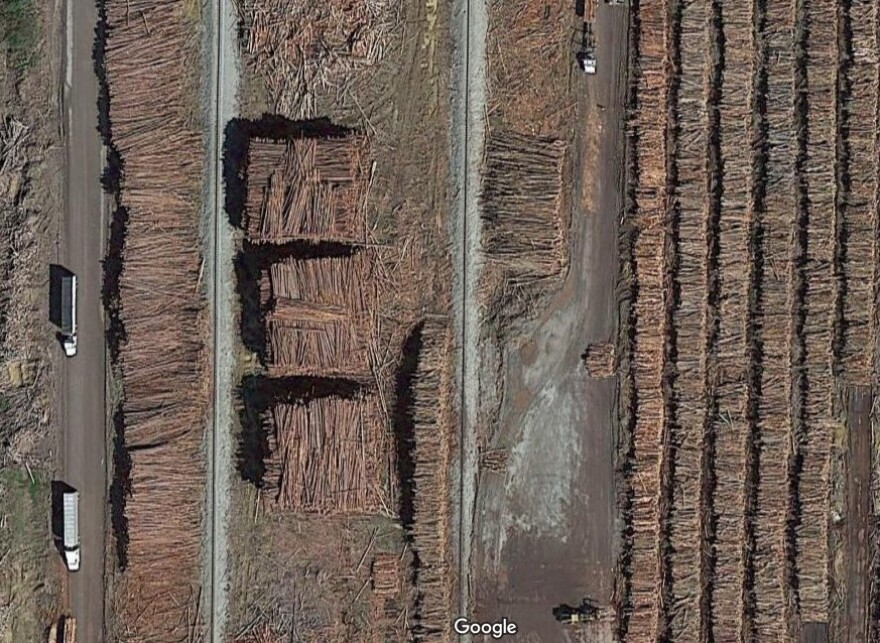Trucks carrying trees and wood waste come and go and machinery hums day and night at the Enviva wood pellet plant in Northampton County in northeastern North Carolina. Like many wood pellet plants across the South, it's in an area that's mostly low-income and majority African American.

"We have people that live directly around these facilities that's having a lot of issues with dust," said Richie Harding, an Enviva neighbor who has organized opposition to the plant. "Every couple of days, they got to wash their cars. The noise, the traffic. You know, it's a lot ... having a facility of this type running 24/7."
Enviva is the world's largest wood pellet maker and opened the plant in 2013 in Garysburg, just off Interstate 95. It used to be an area of woods and farm fields, but that's changed, said Marvin Claiborne. He lives about a half-mile from the plant, which can be heard through the trees.
"It's not healthy at all," Claiborne said. "But after you started hearing the noise and the stuff that's in the air … ain't no telling what you're breathing in."

The trucks and humming machinery are a constant sound, and Claiborne said it's often hard to sleep.
Plants across the region
It's the same story in communities across the South, where Enviva and other companies are cutting trees, turning them into wood pellets and shipping them to power plants in Europe and Asia. Enviva has nine plants from Virginia to Mississippi, including four in North Carolina.
These plants are at the center of two debates — one over environmental justice and another over just how climate-friendly wood pellets actually are.

U.S. exports of wood pellets are up 59% since 2016, with sales approaching $1 billion a year. That's in part because of government subsidies on both sides of the Atlantic and global rules that allow wood pellets to qualify as carbon neutral. But scientists and environmentalists have been pushing back on the rules.
"Framing biomass burning as carbon neutral has incentivized the forest industry to gear up to produce wood pellets for power plants in Britain, the E.U., South Korea and beyond," said Tim Benton with British research firm Chatham House, which published a recent report critical of the wood pellet industry.

Under global carbon accounting, power plants don't have to count CO2 emissions when they burn wood. Instead, emissions are supposed to be counted where trees are cut. The Chatham House report argues that lots of other emissions in the process don't get counted from harvesting, processing, trucking and shipping. Trees do grow back, so they're renewable. But wood pellets actually burn dirtier than coal, which they're replacing.
Government subsidies promote the industry
European governments pay power companies to replace coal with wood pellets. And state and local governments in the U.S. reward companies that build wood pellet operations and create jobs. North Carolina alone has provided $7 million in incentives for wood pellet plants since 2007, including more than $1 million dollars for the Northampton plant.
"The county or the city has made decisions based … on what sorts of industrial operations they would like to invite into their communities, but they don't actually create any parameters around what the environmental or what the community impacts will be like," said Rita Frost of the Dogwood Alliance, an Asheville-based environmental group that targets industrial logging.
Some pellet plants in the South have faced legal action over air pollution. Two years ago, the environmental group CleanAire NC sued to block a state air quality permit for Enviva's plant in in Richmond County.
Regulators approved the permit despite concerns over high emissions of what are called volatile organic compounds. They can cause breathing problems for seniors, young children and people with lung diseases.
Heather Hillaker is a lawyer with the Southern Environmental Law Center, which represented CleanAire NC.
"Fortunately, pretty early in the process, we were able to reach a settlement with Enviva and (the North Carolina Department of Environmental Quality) whereby Enviva agreed to install those pollution control technologies that we had been saying were needed," Hillaker said.
After that, Enviva began installing the same equipment at other plants, including the one in Northampton County, Hillaker said.,
The industry promotes its benefits
Despite concerns, the industry is expanding across eastern North Carolina, which is near East Coast ports and where most forest land is privately owned, with fewer restrictions. Enviva says it's a good corporate citizen and employer. About 100 people work at the Northampton plant, earning 40% more than the county's average wage. Another 300 have jobs with trucking companies and contractors.
"We pay well," said Don Calloway, Enviva's head of equity, inclusion and impact. "… We're very proud of that because these are communities which have been hit hard by the move away from industrialization. Over the last 50 years, a lot of facilities of all kinds — textiles, forest products industry — have left these towns."
Enviva declined our request to visit the plant, citing the pandemic. And county officials did not respond to requests for comment.
The United Nations has endorsed bioenergy as a replacement for fossil fuels. Company officials say they provide a market for low-value wood and encourage their suppliers to replant trees. The Northampton plant meets state air quality standards and in August won an updated state air quality permit.
Still, Harding, the Northampton organizer, worries about the dust. He has a lung condition that sometimes makes it hard to breathe. He said he would like to see the Enviva plant go away, but said, "Realistically, I don't know if our government or our policymakers here are going to do anything to make them leave."
Harding said he wants better dust controls to help meet his goal of a safe community.







